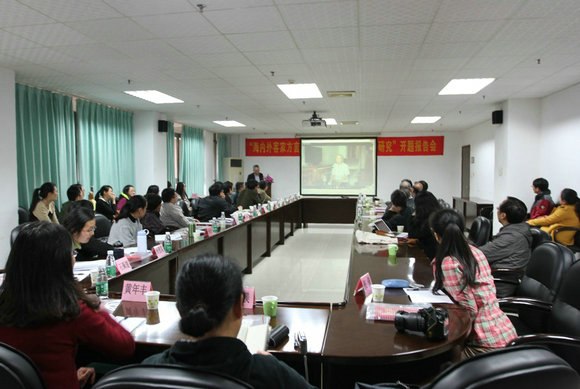Opening report meeting on the major project of The National Social Science Fund “The Corpus Construction and Comprehensive Study of Hakka Dialect” held in SYSU
Source: Department of Chinese
Written by: Li Ning
Edited by: Wang Dongmei
On the afternoon of January 5th, 2015, the opening report meeting on the major project of The National Social Science Fund “The Corpus Construction and Comprehensive Study of Hakka Dialect” took place in the Chinese Hall of Sun Yat-sen University (SYSU). Professor Zhuang Chusheng of the Department of Chinese, SYSU is the chief expert of the project. Nearly 30 people attended the meeting, including Professor Ni Xing (Director of the Office of Social Sciences and Humanities, SYSU), members of the Academic Committee of the project, sub-topic leaders, members of the project in Guangzhou and postgraduate students. Professor Li Wei (Head of the Department of Chinese, SYSU) presided over the meeting.

Opening report meeting on the major project of The National Social Science Fund
"The Corpus Construction and Comprehensive Study of Hakka Dialect" held in SYSU
Professor Ni Xing welcomed the participating experts and scholars, and said that the Office of Social Sciences and Humanities would provide all possible support for the major project. The Department of Chinese at SYSU has obtained five major projects of The National Social Science Fund in recent years, playing an important role in the field of humanities and social sciences.
Professor Zhuang Chusheng gave his report in four respects as follows: the research status and subject selecting values; the general framework and expectation; research logic and methods; focuses, difficulties and innovations. He pointed out that, as a Chinese dialect used by more than 60 million people all through the world, the Hakka dialect is distributed widely around many countries and areas at home and abroad, showing a significant internal difference. However, there are some outstanding issues in the present investigation and research of Hakka dialect. For instance, the corpus data is old, and with many mistakes and omissions; and the partition standard of Hakka dialect needs to be improved. Still, compared to Taiwan, mainland China hasn’t developed any electronic product for customers with regard to Hakka dialect corpus. Therefore, this project would expand its investigation range and contents on the basis of the present research results, especially to do the field investigation of the Hakka dialects in South Jiangxi, North Guangdong, East Guangdong (called as
Bendihua in this area, meaning local language), border area and abroad, and to collect and analyze the documentations written by Western missionaries and sinologists. As a result, two corpora “Audio Corpus of Hakka Dialect” and “Historical Documentation Corpus of Hakka Dialect” will be constructed. Further analysis and research will be made on phonology, vocabulary and grammar separately. Professor Zhuang finally presented a specific case of a newly investigated Hakka dialect of Zhangmutou, Dongguan, using field investigation software and other audio video media.
Then, members of the Academic Committee of the project made their speech one after another. Professor Li Rulong (Chinese Department, Xiamen University) acclaimed that the project would be an overall summary and timely updating of the studies on Hakka dialect. Daring to point out the shortages of former studies, devoting to innovate, and having achieved solid research basis would be some of the features of the project. Professor Cao Zhiyun (Faculty of Linguistic Sciences, Beijing Language and Culture University) confirmed that the chief expert had deep academic accumulation. He insisted that, what the project team should firstly consider about would be the relationship between what to be solved by the project and the national cultural needs. And he also advised the project team to connect the project with other relative projects of China Linguistic Resource Preservation in the future in order to avoid repeated work and waste of resources. Professor Shi Qisheng (Department of Chinese, SYSU) gave his specific advice on the design of the grammar entries of the field investigation. Professor Tang Yuming (Department of Chinese, SYSU) said there should be a major project for every major dialect, which could truly deepen the study of Chinese dialects and support the study of the history of Chinese language. Professor Mai Yun (Language Institute of The Chinese Academic of Social Sciences) emphasized that the filed investigation record and the corpus construction of this project should have a technical standard, which needs cooperation with experts of database construction. Professor Gan Yu’en (Chinese Dialect Research Center, Jinan University) offered some helpful advice on the distribution and size of dialect investigation.
Finally, members of the Academic Committee all agreed that the opening report should be passed. Professor Li Wei thanked all the experts and scholars for their support on behalf of the Department of Chinese, SYSU.
The experts and scholars who attended the meeting also included Professor Xiang Mengbing (Chinese Department, Peking University), Professor Ping-sheng Chang (Department of Chinese Literature, National Sun Yat-sen University, Taiwan), Professor Yan Xiuhong (Faculty of Chinese Language and Culture, Guangdong University of Foreign Studies), Professor Wu Wei (Chinese Dialect Research Center, Jinan University), Professor Lian Chunzhao (College of Liberal Arts, South China Normal University), Professor Wang Maolin (College of Chinese Language and Culture, Jinan University), Associate Professor Lin Huayong (Department of Chinese, SYSU), and Assistant Professor Yu Songhui (International College, Macau University of Science and Technology).